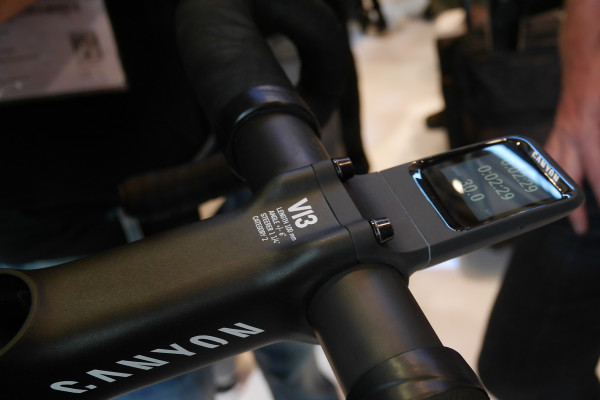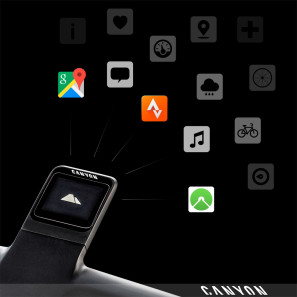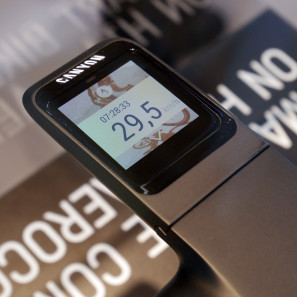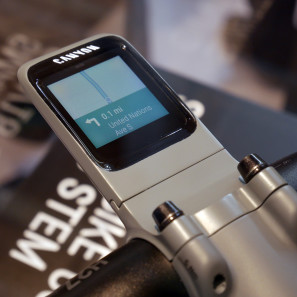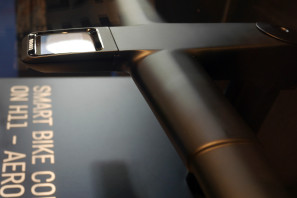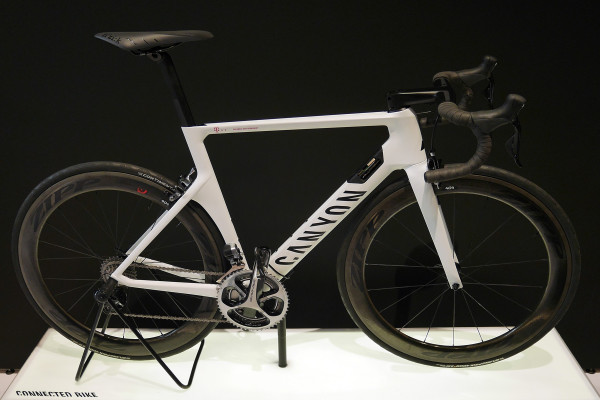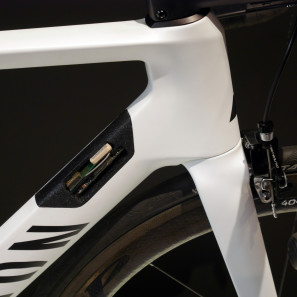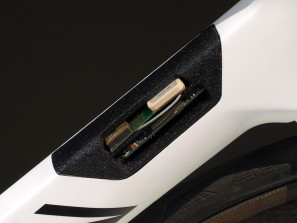At last year’s Eurobike show Canyon had a project bike developed around the concept of integrated and connected electronics. This year they’ve taken a couple of big steps towards making that concept real with a brand new first-of-its-kind App-based cycling computer and further refinement of the connectivity hardware. Given the name Smart Bike Computer, Canyon worked with electronics heavyweight Sony to develop an open-platform solution that will deliver Android Wear app functionality to cyclists this spring, and offer a future-proof product that can be updated as new apps are developed.
Connect with us after the jump to take a closer look at the computer, a video of its integration, and the apps that are already ready to go…
With the Android Wear OS powering the new computer, typically used in the recent growth of smart watches, there are already thousands of apps available in the Google Play store to get the most out of the upcoming SBC. Everything from mapping and navigating to weather updates and messaging is already ready, and with the open source style of Android, there are sure to be more and more cycling-specific apps developed. Right now Canyon is already highlighting three apps that have really been optimized for the computer, including a Strava Wear app with live updating and live segments, when paired with a smartphone.
The Smart Bike Computer gets a sharp 1.6″ LCD touch screen with a trans-reflective finish for bright light visibility, and claims to be far sharper than anything existing on the market. We didn’t get to take one out to play with it in direct sunlight, but visibility was pretty impressive under the harsh trade show lights even at pretty extreme angles. The display is full color, but does seem to maybe sacrifice a bit of color rendition. Text and colors were crisp, but slightly muted, likely as a result of the anti-glare screen. The computer combines Bluetooth LE and onboard GPS chips to communicate with heart rate monitors, power meters, and other training sensors, and to be able to function as a standalone device with a conservative estimate of 8-10 hours of rechargeable battery life.
A Google Maps app provides turn-by-turn road navigation on a set of familiar backgrounds. Pairing with a smartphone (Android and iOS connectivity are both in the works), the Google Maps app will let users search for a destination or POI on your phone and then let the SBC take over and navigate you there. A Komoot app will let riders plan routes across all terrain, and includes offline mapping and navigation for use on trails off the beaten track (and out of reach of a cell tower.)
Canyon developed two basic ways to integrate the computer into their bikes, via a solid slide-on interface that locks in the computer on either style. The first is a simple replacement faceplate for their standard road, mountain, and urban stems. The more integrated alternative will be a special version of their Aerocockpit bar/stem combos that will seamlessly transition from computer to stem for the most aero solution.
The computer arose out of Canyon’s MRSC Connected bike, which got simplified in its concept guise this year to showcase the advancement of the electronics. Paired with mobile communications functionality from T-Mobile, the modified Aeroad takes advantage of the oversized downtube to house the electronics.
Canyon wasn’t ready to set a date or get too deep into the full functionality, but they did say the the hardware in this bike was finalized and working. What they would say is that the standalone hardware would talk to other sensors like heartrate, cadence, and power meters and collect all of the data, but more than just store it, it would regularly update it to the cloud for realtime tracking. That also brings with it security features, like letting riders track a bike if it were stolen and notifying an emergency contact in case of a crash. Expected battery life wasn’t available, but without a screen it should be measured in days not hours. It will also connect to the SBC and use specific apps to display data collected freeing up the computer for other functions.
Pricing for the Smart Bike Computer was said to be right around 200€. And it will be available from early Spring 2016, both with new bikes or as an aftermarket item. The fully connected bike looks like it is probably one more year off.
